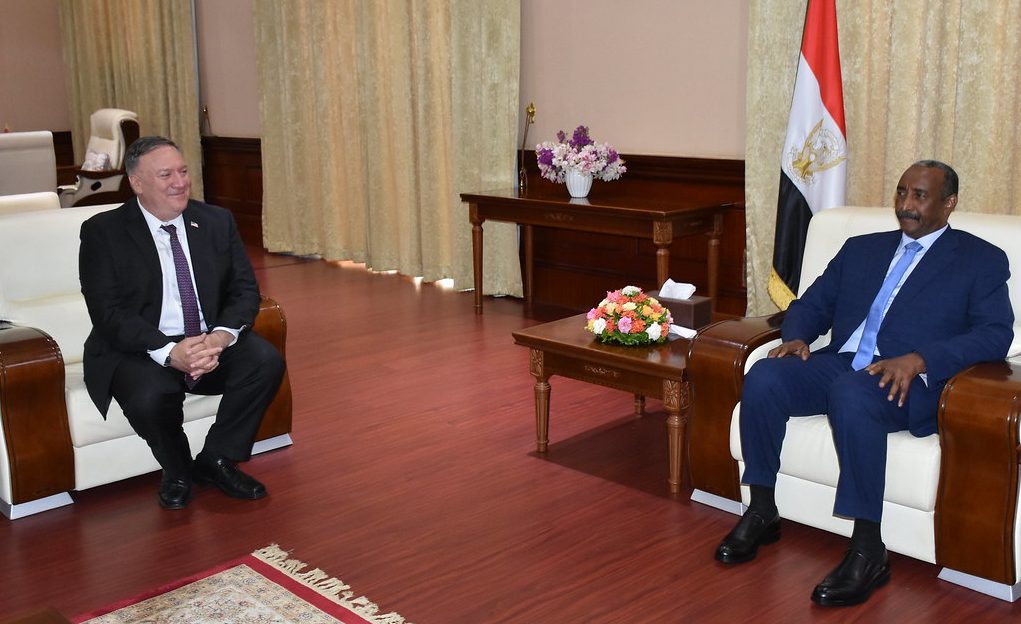
Secretary of State Michael R. Pompeo meets with Sudanese Sovereign Council Chair General Abdel Fattah el-Burhan, in Khartoum, Sudan, on August 25, 2020. Photo by Alsanosi Ali, U.S. State Department.
By Yasir Zaidan
In February 2020, a beautiful resort in the city of Entebbe, Uganda, hosted an extraordinary meeting that opened the door to ending decades of warring relations between Sudan and Israel. But the timing and internal power dynamics in Sudan have already threatened Sudan’s transition to democracy, throwing these negotiations into question.
Sudan’s military had contacted Israel in defiance of the country’s civilian transitional counterparts, which did not support relations normalization with Israel. (Sudan has been in a transitional status following the overthrow of its longtime dictator in 2019; a civilian government has yet to be successfully established.) Meanwhile, Netanyahu’s focus on gaining more allies through the U.S.-brokered Abraham Accords between Israel and other countries in the Middle East seemingly blinded him to the instability of Sudan’s internal politics.
US-supported diplomatic overtures
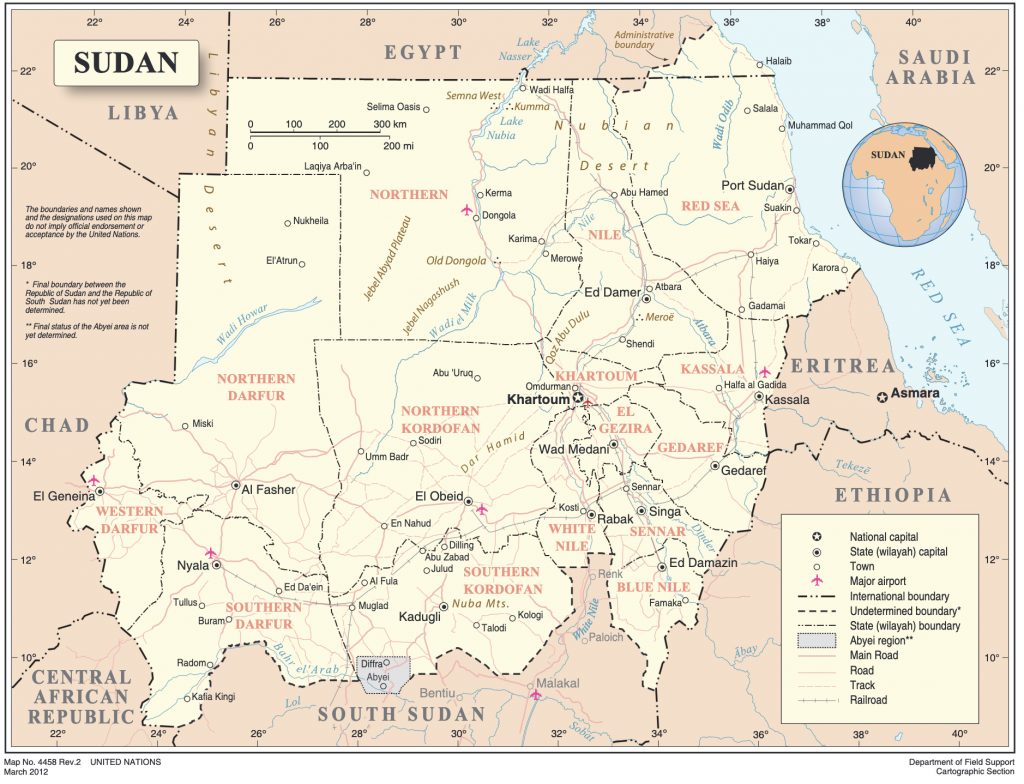
Map of Sudan, March 2012. Via the United Nations.
In February 2020, Israeli Prime Minister Benjamin Netanyahu met with the transitional leader of Sudan, Abdel Fattah al-Burhan — also a long-time general in the Sudanese military — in Uganda. The diplomatic establishment in Washington, D.C., warmly welcomed the meeting, and the ties between the three countries have grown stronger since.
Later that year, the US removed Sudan from the State Sponsor of Terrorism list, citing Sudan’s payment of $335m in compensation to the families of victims of the 1998 US embassy bombings in Kenya and Tanzania. But different reports have indicated that the US move actually came in return for Sudan’s normalization of ties with Israel. Alex De Waal, a respected Sudan analyst, has said that the US president, Donald Trump, and Netanyahu saw an opportunity to gain an additional ally for Israel in Sudan’s shaky political and economic situation.
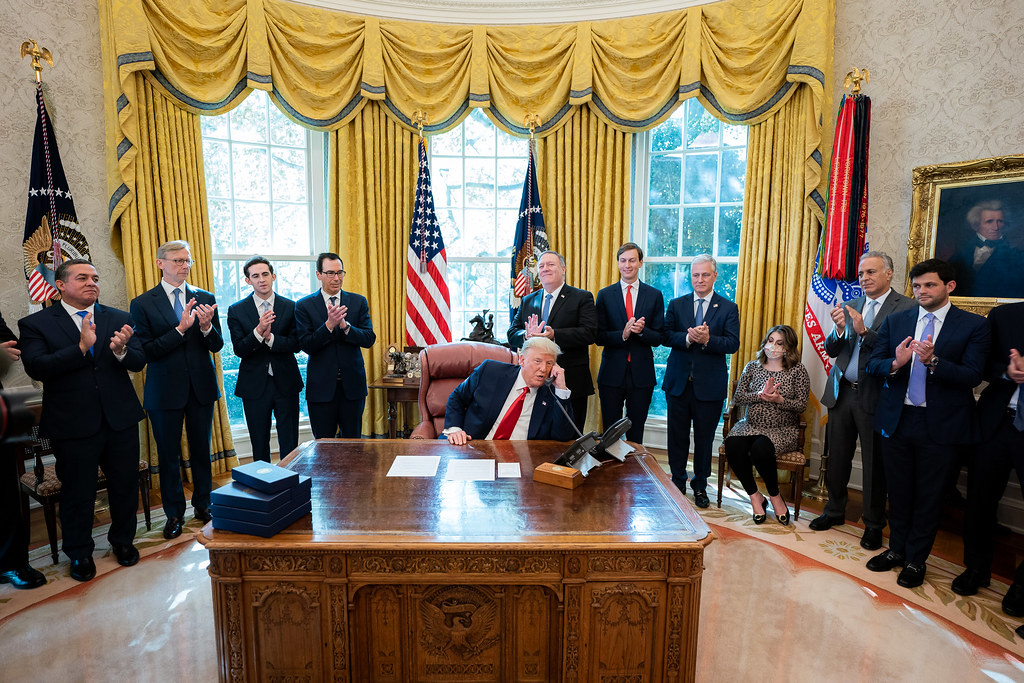
President Donald J. Trump on a phone call with Abdel Fattah al-Burhan, Sudanese Prime Minister Abdalla Hamdok, and Israeli Prime Minister Benjamin Netanyahu, October 23, 2020. Via the White House.
One year later, in June 2021, Sudan joined the Abraham Accords, agreements mediated by the Trump administration to normalize relations between Israel and multiple countries in the Middle East. Sudanese Justice Minister Nasreldin Abdul Bari signed the accords alongside US Secretary of Treasury Steven Munich, who was in Khartoum — Sudan’s capital city — for an official visit. At the same time, however, the Freedom and Change Coalition, the civilian alliance that governed the transitional period in Sudan, did not support the move.
Developments following leadership changes in Sudan and Israel
On October 25, 2021, Sudan’s military chief and the head of the Transitional Council announced his “corrective measures” to the previous transitional year, firing the civilian prime minister and detaining many ministerial cabinet members, effectively instigating a military coup against the civilian government. The move brought an international outcry, except in neighboring countries such as Egypt and Israel. Israeli officials continued to visit Khartoum secretly after the military coup. However, these visits cooled down when Netanyahu was ousted from office in June 2021.
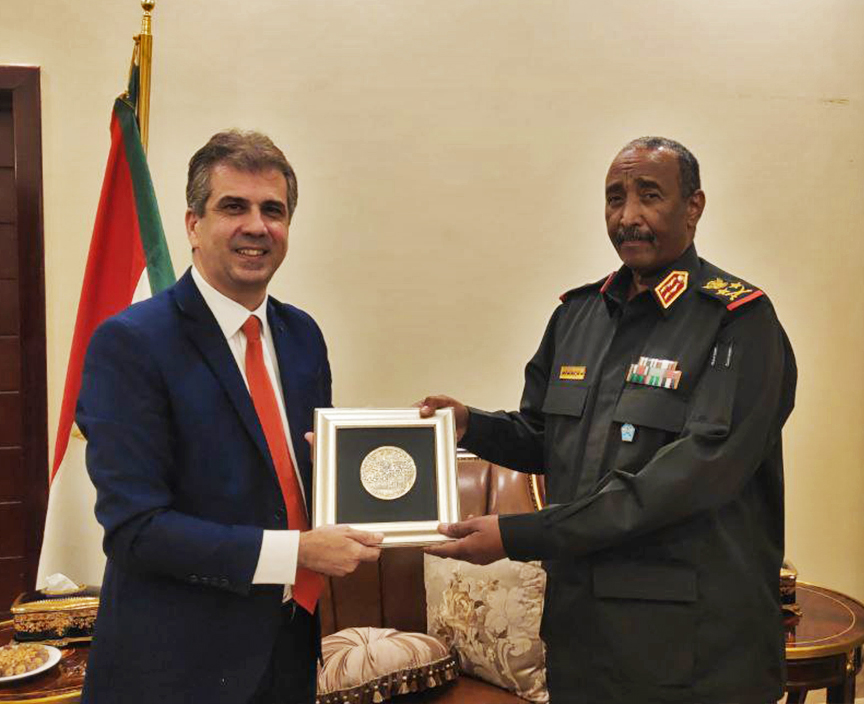
Military leader Abdel Fattah al-Burhan with Israel’s Minister of Intelligence, Eli Cohen, in January 2021. Via Wikimedia Commons.
The Sudan-Israel normalization process seems to have directly depended on Benjamin Netanyahu’s relationship with Al-Burhan. Therefore, security and diplomatic visits between the two countries resumed soon after Netanyahu’s return to the office of prime minister in December 2022. The last of these visits was a trip by the Israeli Foreign Minister, Eli Cohen, who arrived in Khartoum on February 2, 2023. Cohen met with Al-Burhan, and they agreed to move forward with the normalization process that the US was sponsoring. The signing ceremony was supposed to take place after the formation of the civilian government in Sudan.
However, the time frame for the signing step is vague, since the Sudanese military was still negotiating an agreement with the civilian forces at the time of these talks. Moreover, the Sudanese civilian forces’ stand on normalization is also ambiguous since they were not involved in the early talks between Netanyahu and Burhan.
Issues with the normalization process
The fact that the normalization process started during a transitional period in Sudan, and mainly took place between the head of the military and Netanyahu, is troubling. Momentous leaps in foreign policy should be discussed and approved through democratically elected institutions, which are currently absent in Sudan. Moreover, strategic foreign policies require stable governance conditions that are missing today in both Sudan and Israel. Israel has been going through its own political turmoil since Netanyahu proposed a judicial overhaul in early 2023.
Sudan is also going through tense times because of the war between the military and the Rapid Support Forces (RSF), a powerful paramilitary force, which started in April 2023. The military demands the RSF’s full integration into the army during the transitional period, while the RSF believes that integration should come only after deep reforms in the institution of the military.
Foreign policy initiatives during such a rivalry would only serve the individual political actors’ interests rather than national interests. Therefore, they will likely only increase rivalry, especially regarding a sensitive issue such as the normalization of ties with Israel.
Burhan and Netanyahu met in Entebbe because of their individual political interests in their respective countries, where circumstances have threatened any chance for an institutional normalization that would represent the people’s will. While Netanyahu portrays his ties with Sudan as a foreign policy victory, it could backfire if a future elected government in Sudan associates the normalization agreement with the military. Such a tactical agreement will jeopardize future opportunities to restore Israel-Sudan relations by an elected Sudanese government.
 Yasir Zaidan is a Ph.D. candidate at the Henry M. Jackson School of International Studies at the University of Washington. Zaidan’s research investigates the intersection of local, national, and regional politics of port development projects in three port cities in the Red Sea. His research focus has partially developed from his work experiences across East Africa and the Middle East. Before starting his Ph.D. studies, Zaidan worked as a research assistant at the Washington Institute for Near East Policy. He earned an M.A. in statecraft and national security affairs from the Institute of World Politics in Washington, D.C., which focused on a comparative national security system. He received his undergraduate degree in electrical engineering at the University of Khartoum in Sudan in 2012. He is a 2022-2023 Robinovitch Family Fellow in Jewish Studies.
Yasir Zaidan is a Ph.D. candidate at the Henry M. Jackson School of International Studies at the University of Washington. Zaidan’s research investigates the intersection of local, national, and regional politics of port development projects in three port cities in the Red Sea. His research focus has partially developed from his work experiences across East Africa and the Middle East. Before starting his Ph.D. studies, Zaidan worked as a research assistant at the Washington Institute for Near East Policy. He earned an M.A. in statecraft and national security affairs from the Institute of World Politics in Washington, D.C., which focused on a comparative national security system. He received his undergraduate degree in electrical engineering at the University of Khartoum in Sudan in 2012. He is a 2022-2023 Robinovitch Family Fellow in Jewish Studies.






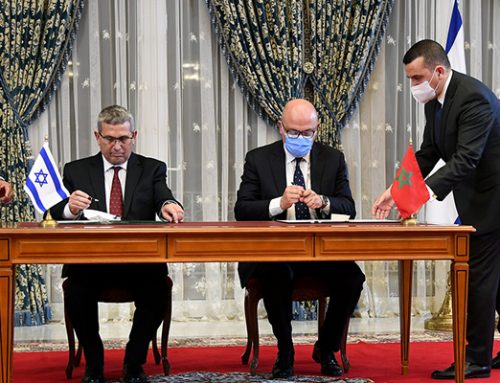
Leave A Comment